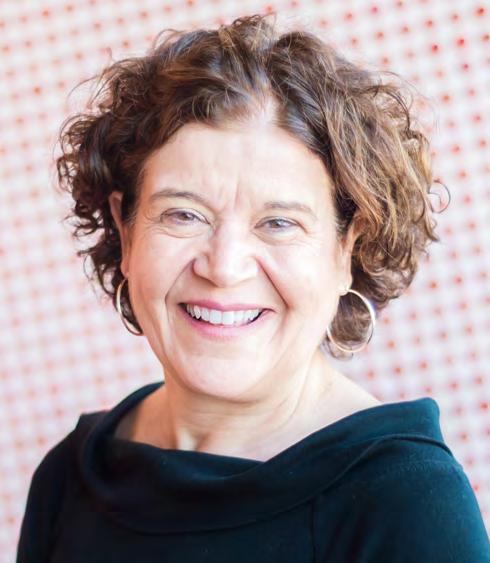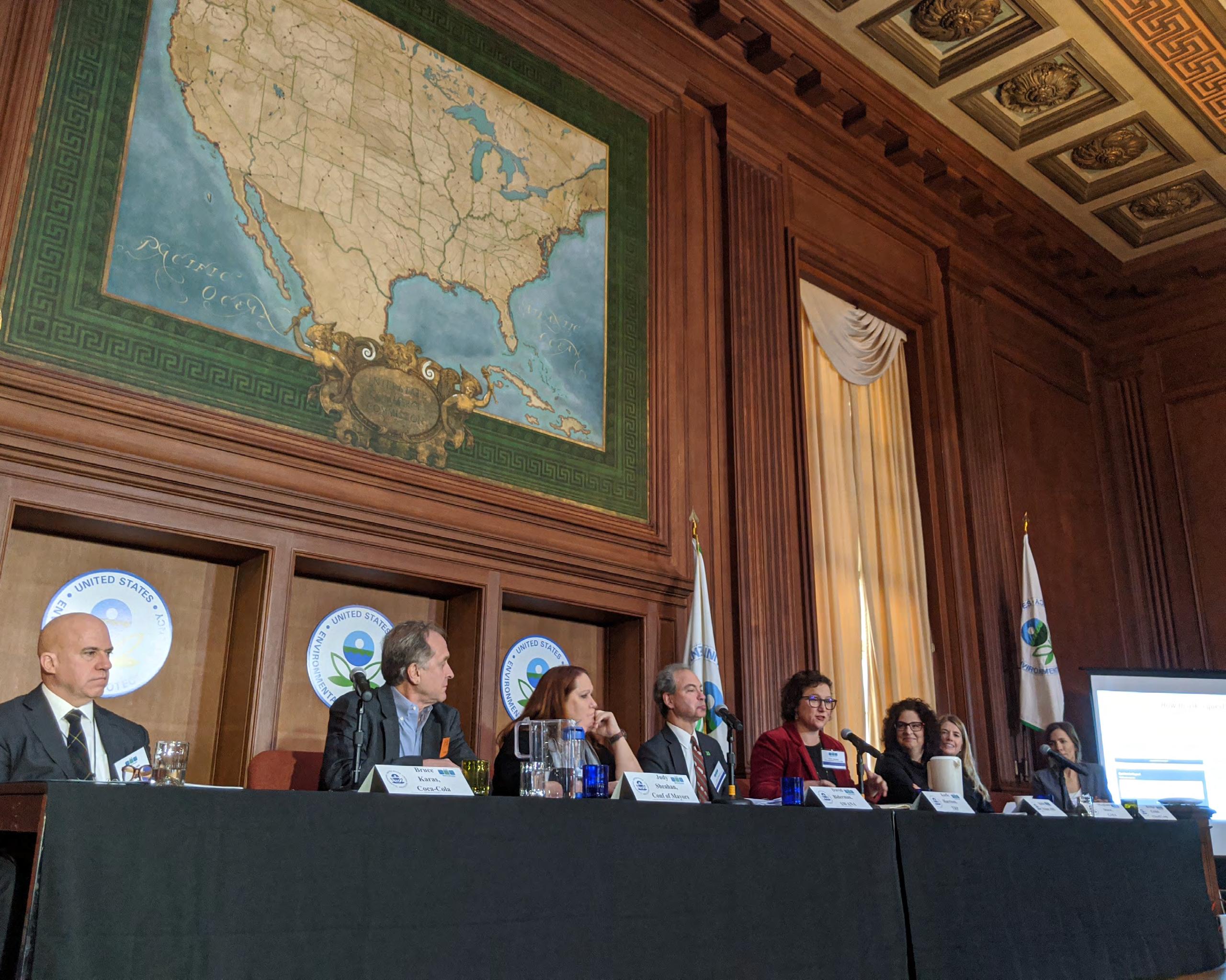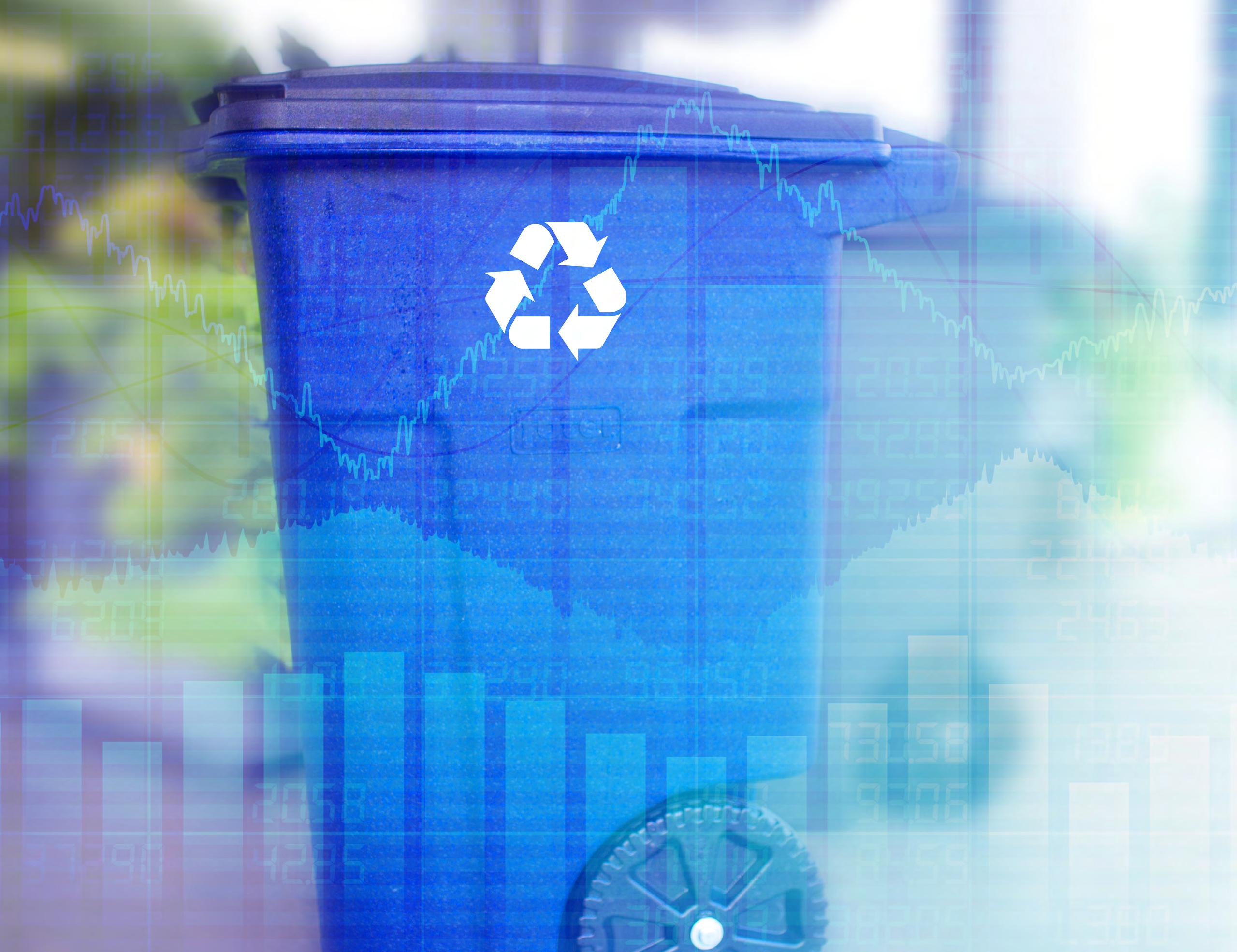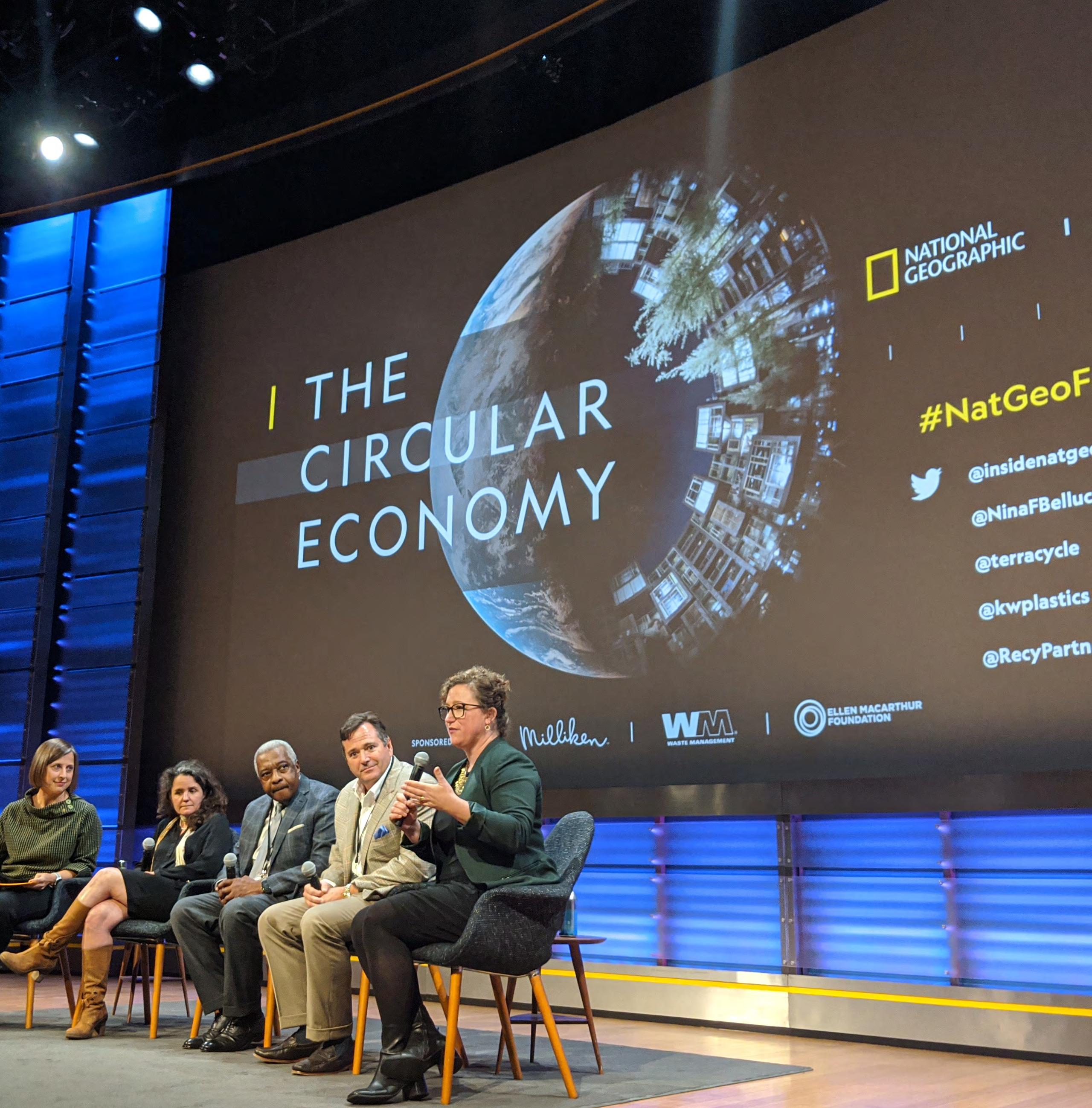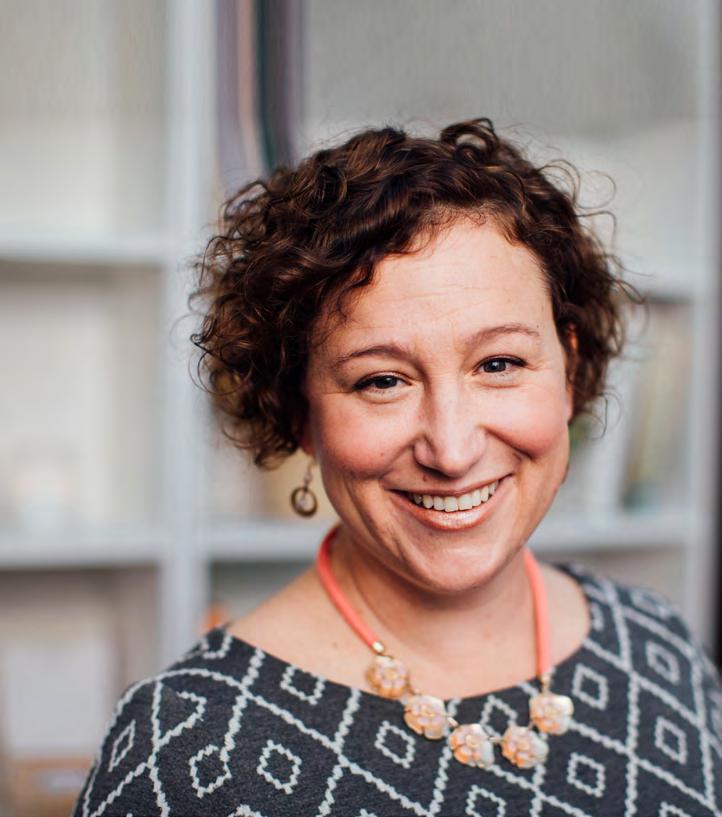
19 minute read
Community Engagement
Community Engagement SERVING CITIZENS NATIONWIDE
Advancing the recycling collection system to unlock supply from all U.S. homes is a core pillar of our work. We know that quality recyclables – the supply – are in the home, and recovering that supply is managed by cities, counties, and solid waste authorities. There are three words that define our philosophy as we support this system: action, collaboration, and scale.
In order to unlock supply at the scale the U.S. needs, we are reaching further, faster than ever. We have diversified our grant and resource development beyond individual towns, establishing strategic partnerships with United States Environmental Protection Agency (EPA) regions, states, MRFs, haulers, and regional governments. We seek out creative solutions that lead to game-changing initiatives in the industry, unlocking supply of quality recyclables at a rapid and replicable scale. We are building a network of amazing people that manage and link critical aspects of the U.S. supply chain who, with the right tools, will continue to transform our recycling system and catalyze the circular economy.
This report presents a representative sample of our work using these principles.
In 2019, The Recycling Partnership launched the West Coast Contamination Initiative (WCCI) to work together with all recycling stakeholders in California, Oregon, and Washington State to improve the quality of recyclables collected at the curb. The investments went toward gathering data, engaging with stakeholders, hosting workshops, and creating collateral specifically for the West Coast communities – extending The Partnership’s reach in a region where we previously had little to no presence.
The Recycling Partnership team connected with more than 300 recycling stakeholders in these states through in-person meetings and networking events. Our data-gathering efforts reached 212 cities and 98 MRFs, while also getting critical feedback from more than 3,000 citizens, giving us insight into key issues affecting the diverse stakeholders and identifying opportunities to meaningfully improve material quality.
As a result of this initiative, we will be giving out grants to communities on the West Coast looking to address contamination. Our first community grant will go to Spokane County, Washington to reduce unwanted materials in the recycling carts of more than 340,000 citizens.
Minnesota: Leveraging Statewide Partnerships to Advance Multiple Communities at Once
In 2019, The Recycling Partnership capitalized on grant funding from the EPA to create change on a statewide level in Minnesota. Working with the Minnesota Pollution Control Agency (MPCA), The Partnership created a statewide messaging campaign to raise citizens’ recycling IQs and incite more Minnesotans to participate in their local recycling program.
The turnkey element of the campaign was a basic list of what is and isn’t recyclable, which standardized “the basics” of what is and is not recyclable throughout the entirety of the state. This, along with a statewide communications plan, armed state recycling leaders to teach municipal recycling coordinators how to push the new messaging to their citizens. Resources for community recycling programs included educational videos, recycling quizzes, an annual info card to be mailed to all citizens, social posts, and more. The statewide campaign and corresponding resources were released during workshops at the Recycling Association of Minnesota’s annual conference. After the in-person trainings, The Partnership launched a website solely for state recycling coordinators to access the campaign materials. A series of pre-recorded webinars serve as an online tutorial for coordinators, who now have a home base from which to download and disperse resources to their communities.
As part of the EPA grant, five communities received seed grants to design and implement improved strategies for material capture in their multifamily recycling programs and measure the findings. Each of the five grantees – City of St. Paul, City of Minneapolis, University of Minnesota, Lyon County, and Pope Douglas County – focused on a different set of challenges for their multifamily communities – including outreach and messaging to property managers and information provided to citizens on existing recycling services available at their multifamily dwelling.
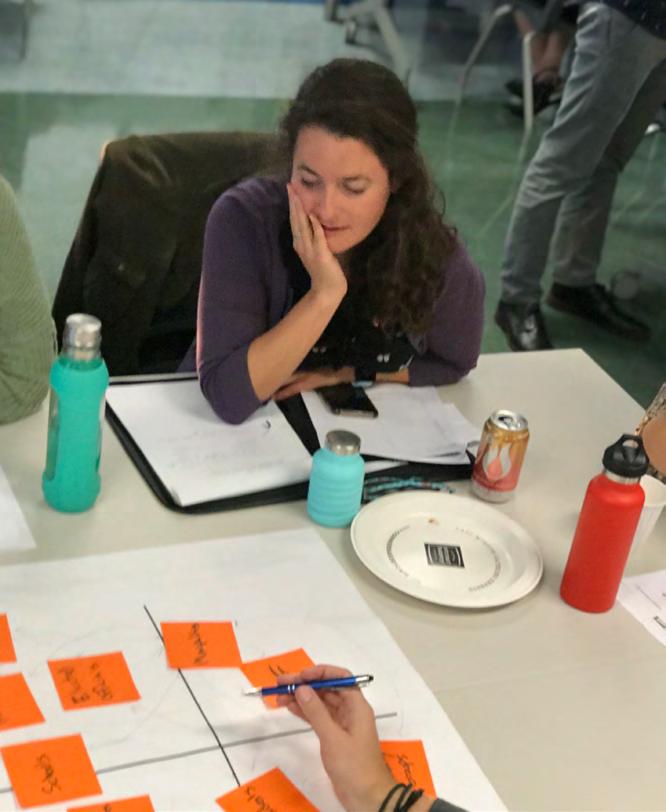
Recycling is the norm in New Jersey and has been for many decades. However, recent market pressures have necessitated communities to revisit how their programs run and move toward a more efficient cart-based collection system.
As The Recycling Partnership began granting funds to select communities in the state, the success of the cart deployment caught the attention of the community next door. Neighboring towns – ready for the next level of investment and modernization – saw the success of The Partnershipsupported rollout firsthand, leading to a domino effect of infrastructure granting opportunities across the state.
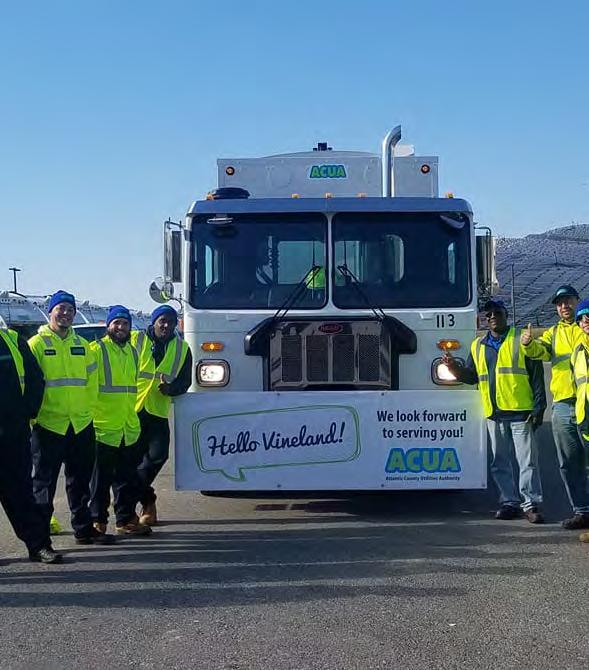
The Recycling Partnership has implemented six grant projects in New Jersey since January 2019 and expects to fund more in the coming year. As individual towns share their successes with one another, our community partners have turned into organic ambassadors for The Partnership model – leading to collective change across the state.
The effort in Vineland in particular illustrates how carts can inject a new level of performance into an already strong system. Prior to distributing carts, the City of Vineland’s curbside recycling program was collecting a robust 476 pounds per household per year. The distribution of carts and outreach materials helped propel the community to a new level of success, boosting annual program tonnage by nearly 21% and resulting in a post-cart collection rate of 575 pounds per household per year. Vineland’s experience with carts was so successful that its neighbor to the south, Millville, decided to make the same transition just over a year later.
Vineland, NJ
Bergenfield, NJ
The City of Vineland distributed recycling carts to just under 17,000 households in December 2018 to launch cart-based collection in January 2019.
The Borough of Bergenfield distributed recycling carts and educational materials to just under 7,500 households in April 2019.
Beach Haven, NJ
Ventnor, NJ
Millville, NJ
The Borough of Beach Haven distributed recycling carts to nearly 2,100 properties in this coastal town to support the implementation of cart-based collection in May 2019.
Ventnor City distributed recycling carts to nearly 4,600 households to implement cartbased collection in June 2019.
The City of Millville distributed recycling carts to just more than 8,000 households in March 2020.
Expanding Multifamily Recycling in Orlando, FL
In 2019 The Recycling Partnership started to take action on the largest source of potential new material supply and recycling access in the U.S.: multifamily households. One of the first projects was in the city of Orlando, Florida, with a population of approximately 270,000 and nearly 75,000 multifamily residential units. Orlando recently passed a mandatory commercial recycling ordinance that includes multifamily properties. The ordinance will be phased in over four years and the largest multifamily properties are required to comply by April 2020. The overall pilot project is comprised of three main actionable components:
1. Add local staff capacity by hiring a full time Multifamily Recycling Project Manager.
2. Develop effective recycling education/information interventions specifically for Multifamily properties.
3. Conduct an in-depth waste and recycling audit on a select number of properties within the City.
The Partnership’s work with Orlando focuses on examining the impacts of a mandatory multifamily recycling ordinance to both expand collection to properties not yet recycling and utilize coordinated outreach material to improve recycling at properties that are currently recycling. Education and outreach elements from the project will be directed at all multifamily properties in the city. Orlando hired a full-time multifamily recycling coordinator in January 2020 and has provided web-based and in-person Open Houses for properties striving to comply with the new ordinance as well as working with The Partnership on design for education materials. The waste and recycling audit portion of this pilot have been delayed until approximately July 2020 due to COVID-19.
Based on The Partnership’s estimates, only 30-40% of multifamily units have access to recycling in the U.S., presenting a
significant opportunity to establish best practices and unlock critical supply across the recycling system. The Partnership’s work in Orlando, San Marcos, TX, Atlanta, and other U.S. cities will help to establish best management practices and new tools that can be implemented on a larger scale with future community partners.
Improving Economics by Reducing Regional Contamination in Partnership with Akron, Ohio, and the Ohio EPA
40% Contamination reduction
$ 20 Value increase per ton
Contamination was reduced by 40% in just 12 weeks.
The value of clean recyclables increased by over $20 per ton in just 12 weeks.
75% of Akron reached
$ 54K In contamination fee savings
As part of the partnership with the Ohio EPA, 75% of households in Akron were reached as a result of this project.
As of January 2020, the City of Akron had saved $54,000 in contamination fees paid to the recycling center.
Source: Table graphics as reported by Keep Akron Beautiful, the organization that managed the work on the group in conjunction with The Recycling Partnership.
Like many communities across the U.S., Akron, Ohio was experiencing contamination levels of debilitating proportions. With a contamination rate of nearly 40%, the community’s recycling program was in jeopardy. The Recycling Partnership and the Ohio EPA teamed up to tackle this challenge head on with Akron and four other pilot Ohio communities: Cincinnati, Columbus, Fairfield, and Centerville.
With additional partners Keep Akron Beautiful, Summit County, and Waste Management at the table, the City of Akron implemented The Recycling Partnership’s “Feet on the Street” program in April 2019, deploying a targeted education and outreach campaign to inspect each of the area’s 33,000 households for four consecutive weeks. An inspection crew was hired to identify contaminated carts by opening cart lids to survey what’s inside, leaving behind an “oops tag” informing citizens of any materials incorrectly placed in their cart. Staying true to The Partnership model, contaminated carts were not collected. Instead, citizens had to remove the contaminants from their cart before their recycling would be collected. This action strongly incentivizes the citizen to change their behavior and is a tool we’ve found to be an important behavior-change lever through our ongoing research.
Akron saw meaningful results: contamination was reduced by 40% and the value of clean recyclables increased by over $20 per ton, or 80%, in just 12 weeks. As of January 2020, the City of Akron had saved $54,000 in contamination fees paid to the recycling center. 1
Building off this success in Ohio, the state of Michigan’s Department of Environment, Great Lakes & Energy capitalized on The Partnership’s creative model to improve quality at drop off locations and the curb throughout the state. That work will begin summer of 2020.
While we celebrate our impact and the accomplishments with so many of our city and state partners, we also recognize the lasting impacts that the COVID-19 pandemic may have on recycling programs and supply nationwide.
At the release of this Impact Report in May 2020, we have started to see declines in commercial volume and increases in residential volume as people are spending more time at home. We also recognize that local government programs funded through general fund dollars like sales tax are facing the reality of budget shortfalls as they plan for next year’s budget.
While the large majority of curbside programs and MRFs are still operating, some have temporarily suspended due to shortage of staff and health and safety.
We know our MRF and community partners put safety first and are dedicated to the well being of important front line workers in waste and recycling.
The Recycling Partnership continues to be attentive and flexible as needs in the marketplace
may change. Our team of problem solvers are prepared to provide support, technical assistance, and grant dollars as recycling programs navigate the challenges that may lie ahead.
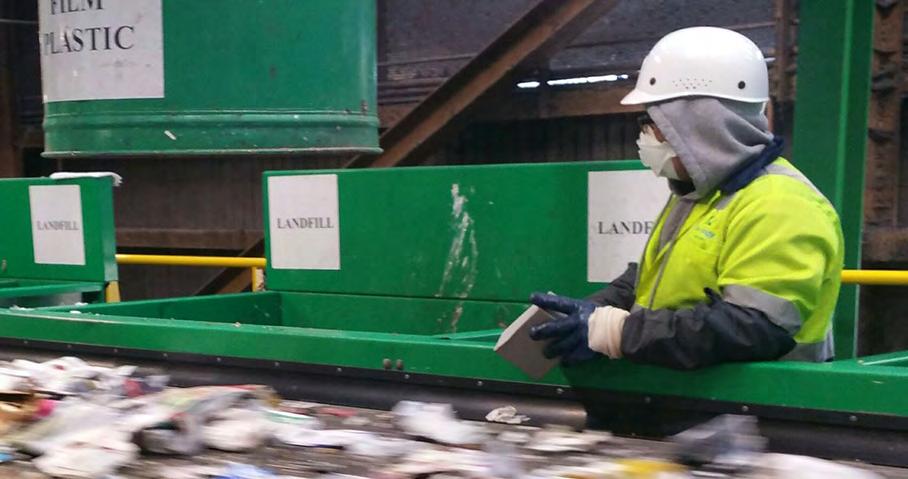
Do you Know What to Throw? Teaching North Central Texas Citizens to Recycle More, Better Where They Live, Work, and Play
As part of the national approach to increase the capture of more bottles and cans, The Recycling Partnership teamed up with Closed Loop Partners to launch a regional recycling education campaign in January 2020 to ensure that the citizens of North Central Texas know what to throw in their recycling carts. This program
highlights The Partnership’s broader efforts to improve recovery of materials through existing recycling programs by using behavior change research, analytics, and best practices for communications to citizens.
While some citizens incorrectly bag their recyclables before placing them in the bin, others wish that certain things could be recycled at the curb—such as plastic bags, plastic films and wraps, food, clothing, batteries, and small electronics—and mistakenly add those into their recycling. Some of these items can damage equipment in recycling facilities, some can be harmful to workers, and others can shut down a facility causing delays, all of which can be costly.
The Partnership’s work with the North Central Texas Council of Governments (NCTCOG) started in 2019, with an effort that provided a free online portal for all 16 counties (covering more than 8 million people) that contained free education and outreach resources for the municipalities to educate citizens on what is and isn’t recyclable in their region. The Partnership built upon our 2019 work for the 2020 campaign and reached out to citizens throughout the NCTCOG through newspaper ads, movie theater ads, Google search ads, and more to reduce contamination in recycling carts and raise awareness for recycling.
Cart Tagging
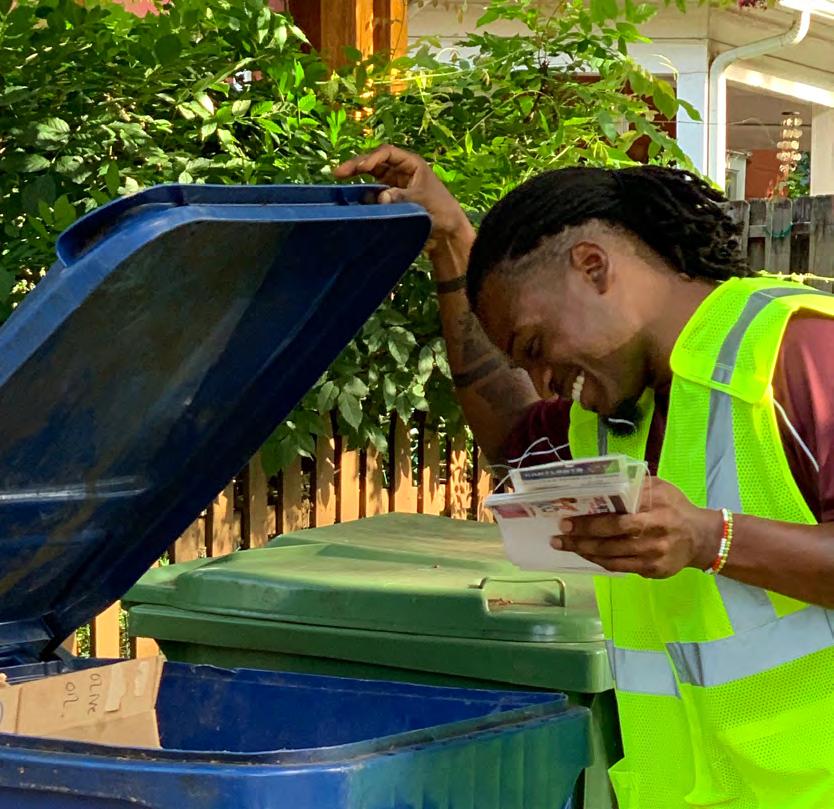
Multifamily
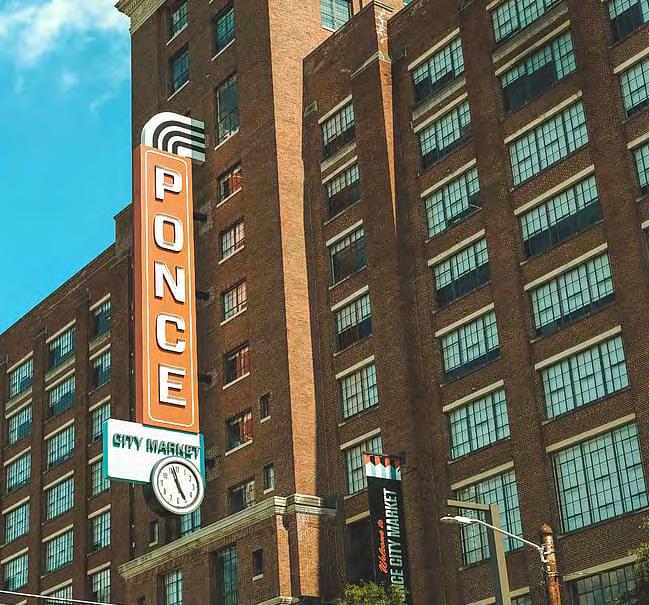
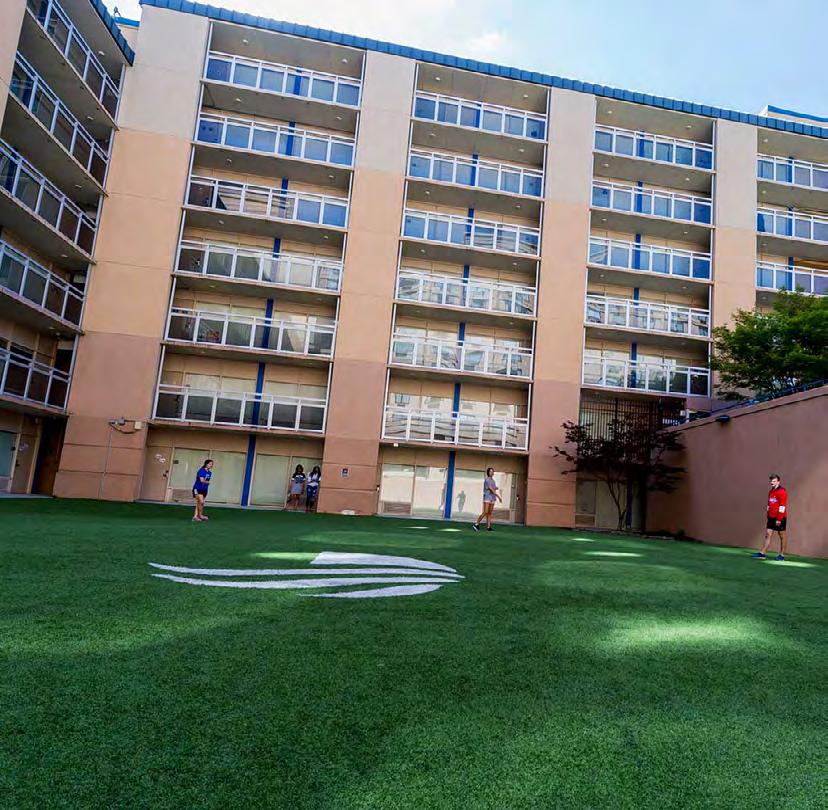
Residence Halls at Georgia State University
A Multi-Pronged Approach in Atlanta, GA Leads to Citywide Improvements
In 2019 The Recycling Partnership embarked on an ambitious new endeavor: make Atlanta a model city for recycling. To achieve this goal, The Partnership worked with multiple stakeholders, including universities, multifamily property owners, and commercial businesses to create a multi-pronged approach to improve recycling in Atlanta.
First, The Recycling Partnership’s “Feet on the Street” cart tagging campaign was successfully rolled out citywide to reach all 98,000+ single-family households, with four consecutive weeks of household participation data and direct feedback to citizens about how well they are recycling in their curbside carts. Teams tagged citizens’ carts with oops tags when they had nonrecyclable items in their carts and didn’t pick up recycling carts with contaminated items. The targeted routes
showed a 19% decrease in contamination and a 9% increase in recyclable materials captured.
The accompanying media and communications campaign achieved more than eight million total impressions and drew more than 19,000 new users to the City of Atlanta’s recycling website to learn what is and is not recyclable -- more than tripling the traffic the site received in a similar period in the prior year. Increased traffic to the City’s website is critical in improving citizen education and resulted in improved recycling behaviors.
The launch of our multifamily approach in Atlanta resulted in stakeholder meetings and collaborative problem solving with the Atlanta Apartment Association, multifamily property managers, haulers, and MRFs to identify gaps and opportunities. This groundwork will lead to new and improved recycling services for thousands of Atlanta multifamily residents in 2021.
In our Atlanta university work stream, The Recycling Partnership collaborated with Georgia State University (GSU) on an infrastructure improvement and education project for two large residence halls – home to more than 1,200 students. Additionally, we worked with simplehuman to direct a donation of 400 dual recycling and trash receptacles to provide more recycling access across GSU’s campus.
The Partnership will continue to engage stakeholders in innovative ways to further the collective recycling system in Atlanta through 2022 and apply the learnings to advance other cities across the U.S. toward comprehensive programs.
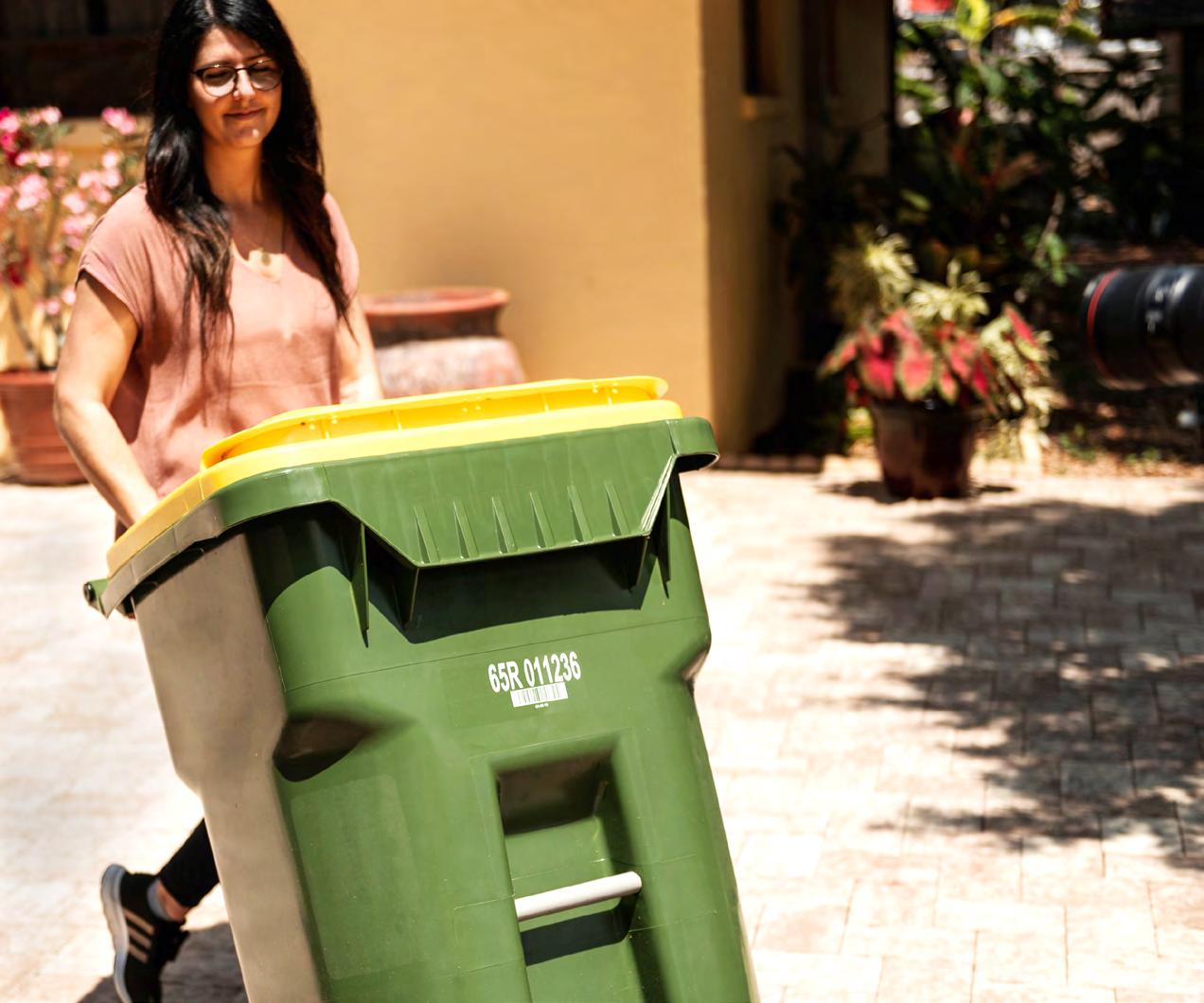
Efforts in Smaller Communities Support Big-System Progress
Red Wing, Minn., Dickinson, N.D. and Sedalia, Mo. are examples of smaller communities throughout America’s heartland making big investments in their recycling system with financial and technical assistance from The Recycling Partnership. Across the U.S., there are
roughly 18,000 communities with populations under 25,000 citizens, making these communities a critical part of The Partnership’s efforts to unlock supply of material.
• A town of 16,500 on the banks of the upper Mississippi River, Red Wing, Minn. made the switch to 96-gallon curbside carts in September 2019. In total, Red Wing saw a 25% jump in the per household recovery of all materials, including a doubling of the capture rate for polypropylene and a 41% increase for aluminum cans. As a sign of effective outreach, the contamination rate rose only slightly, from 5 to 6%, proving that a move to carts does not necessarily worsen material quality, if coupled with solid education.
• Dickinson, N.D. wrapped up their grant project in the Fall of 2019, distributing more than 7,400 recycling carts as part of implementing first-time collection in this community – which now recycles nearly 1,000 tons per year.
• Sedalia, Mo. was able to more than double the effectiveness of its municipal curbside recycling effort with the help of carts and educational support – their project showed a 135% annual increase in recyclables collected as of November 2019.
The Recycling Partnership’s Free Open Source Resources for Communities
The Recycling Partnership’s website offers free online resources to communities that outline the best management practices for tackling contamination at the curbside, at community dropoff recycling centers, homes, offices, or anywhere. In 2019, The Partnership launched DIYSigns -- an online tool with editable templates available in a variety of sizes from a bumper sticker to a poster. No special software is needed to edit any of our free resources and anyone can use them. The Partnership also recently updated our Social Media Toolkit, Anti-Contamination Toolkit and Campaign Builder – all of which have been designed to provide steps, tools, and free resources to improve the quality of community recycling programs. To date, more than 700 communities representing 3 million households have benefited by downloading our free videos, campaigns, social media kits, and other education tools.
(123) 456-7890
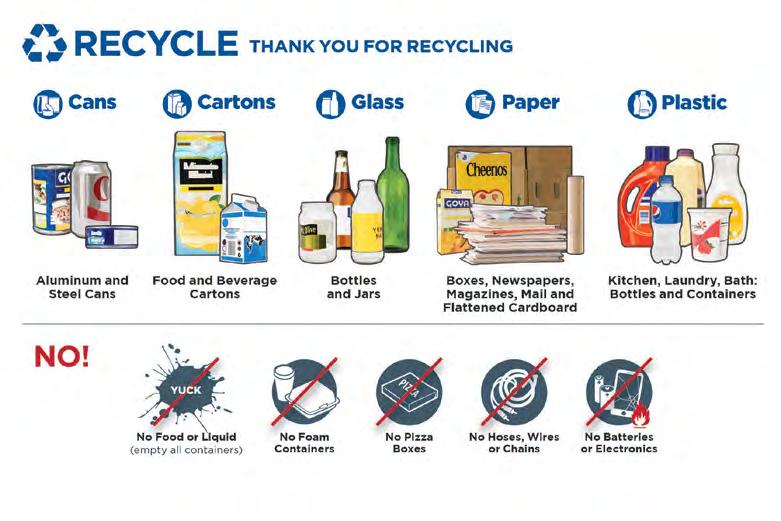
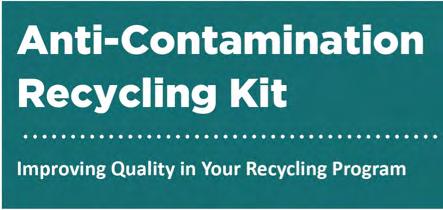
sampleurl.org
Expanding Recycling and Reducing Ocean-Bound Plastics in Sarasota County, FL
Sarasota County, FL operates a recycling program that serves approximately 283,000 citizens in the unincorporated areas of the county and provides curbside collection services for 158,000 households. As part of our work to stem the tide of ocean-bound plastics, The Recycling Partnership provided a grant to help the county transition its curbside recycling program from a dual-stream, 18-gallon bin-based system to a fully commingled cart-based system. Support from The Partnership also included technical assistance, access to educational resources and outreach materials, a Partnership-funded study to measure the before and after impact of the recycling program transition, and grant funding to conduct coastal cleanup initiatives.
From October through December 2019, the community distributed recycling carts and educational materials to its curbside recycling households. The new collection system kicked off in January 2020; results through the first quarter show a 17% increase in tonnage over the previous year. Citizens in the county are celebrating the new collection system and the county staff have received a great deal of praise for a wellexecuted transition.
In 2019, The Partnership launched DIYSigns — an online tool with editable templates available in a variety of sizes from a bumper sticker to a poster. To date, more than 700 communities representing 3 million households have benefited by downloading our free videos, campaigns, social media kits, and other education tools.
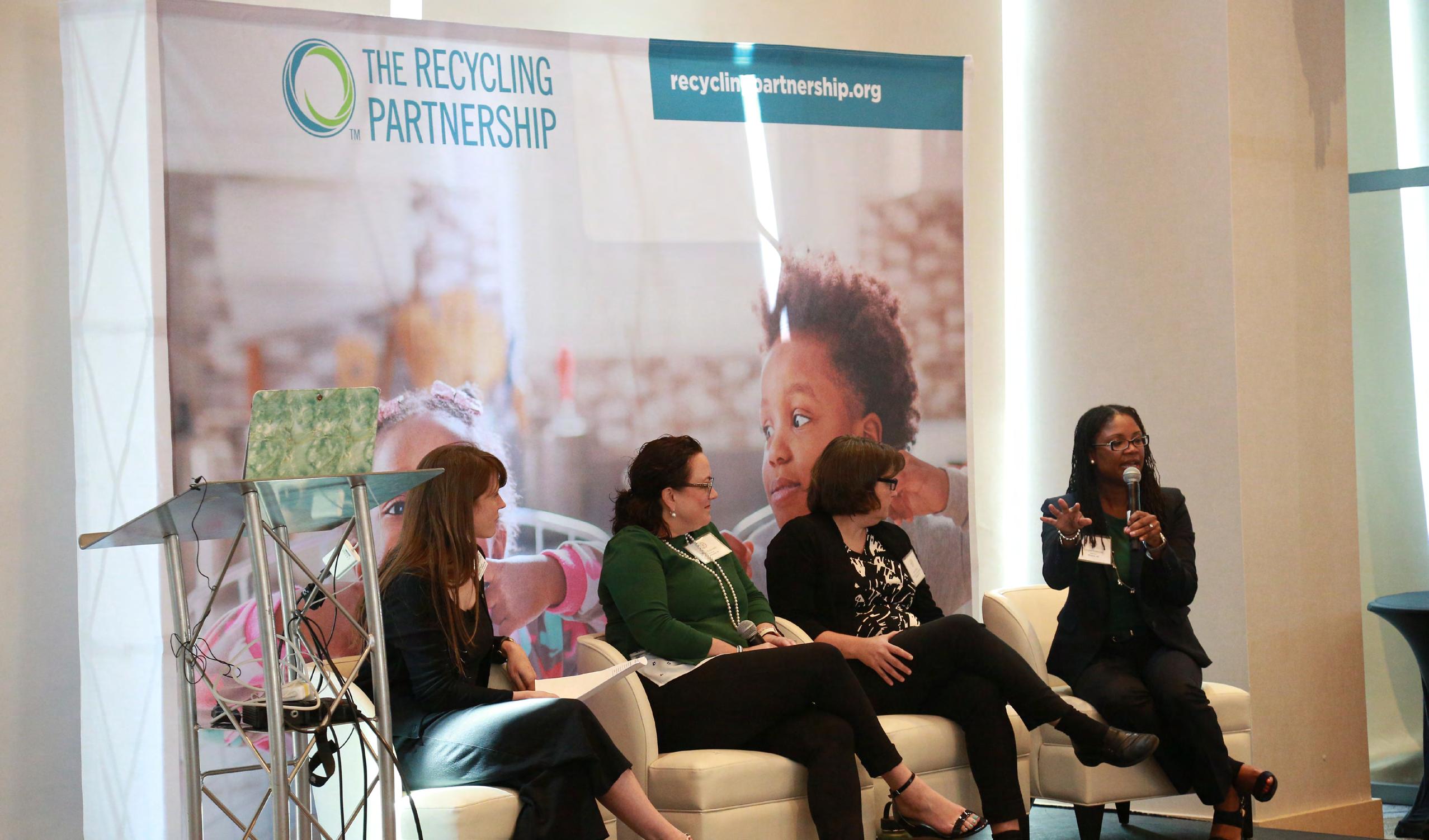
Leading the Leaders: Surveying and Supporting the Recycling Needs of the Largest U.S. Cities
In 2019, The Recycling Partnership hosted its inaugural Leadership Summit: 50 Cities Driving the Circular Economy in Chicago, IL. The event brought together solid waste leaders and decision makers from 50 of the largest cities geographically dispersed throughout the continental United States for the two-day summit, which sought to drive recycling systems change across the country.
After the Summit, we flipped the script: instead of releasing an RFP outlining our latest grant opportunities, we asked participants to submit an RFI: what did they need to make their recycling programs more successful?
We received 28 applications totaling more than $8.1 million. Requests ranged from assistance with multifamily programs to decreasing contamination and infrastructure and even staffing. Thanks to the generous support of Target and Walmart Foundation, we are able to fund 11 communities totaling more than $2.7 million through our new Leadership Grants. The grants stemming from the event will reach an additional 2.2 million households across the country.
Building off the success of the inaugural Summit, The Recycling Partnership will host its second Leadership Summit: 50 Cities Driving the Circular Economy in Fall 2020. Additionally, The Partnership is launching a complementary 50 States Summit, where we will bring together state leaders to leverage connections and state dollars to supply more recycling grants on a larger scale throughout the U.S.
2019 Leadership Summit Grantees
PROJECT
Baltimore, MD
Houston, TX PROJECT DESCRIPTION
Omaha, NE
Complete an anti-contamination strategy to include informational mailers, targeted informational mailers, and oops tags.
Complete both a capture rate study to better target messaging and a pilot cart audit to test the acceptance and impact with residents.
Philadelphia, PA
Transition from bin-based manual curbside collection to automated collection of carts.
Portland, OR
San Diego, CA
Complete an anti-contamination campaign. Perform a waste characterization study and community focus groups to better understand contamination issues.
Tacoma, WA
Grant funding supports testing new methods of proactive, culturally-relevant engagement of multifamily property owners and residents in areas of Portland most vulnerable to housing displacement. Culturally relevant multifamily education strategies will be co-created with community partners.
Conduct a pilot program to test six different outreach methods at multifamily properties for multicultural audiences.
Tucson, AZ
Washington, DC
Central Virginia (Richmond Area)
Detroit, MI
Expand on current multifamily programming and provide resources to improve material quality and increase participation.
Complete anti-contamination strategy to improve the quality of curbside material.
Working with the City to reduce contamination through education and increasing access to multifamily communities.
Helping to start recycling programs in multifamily communities and improve quality of recyclables through education in communities where programs do exist.
Grant to support the hiring of a recycling coordinator to over see recycling program improvements and expansions.
HOUSEHOLDS REACHED
210,000
40,000
145,000
580,846
252,842
484,336
80,012
194,786
15,000
255,957

